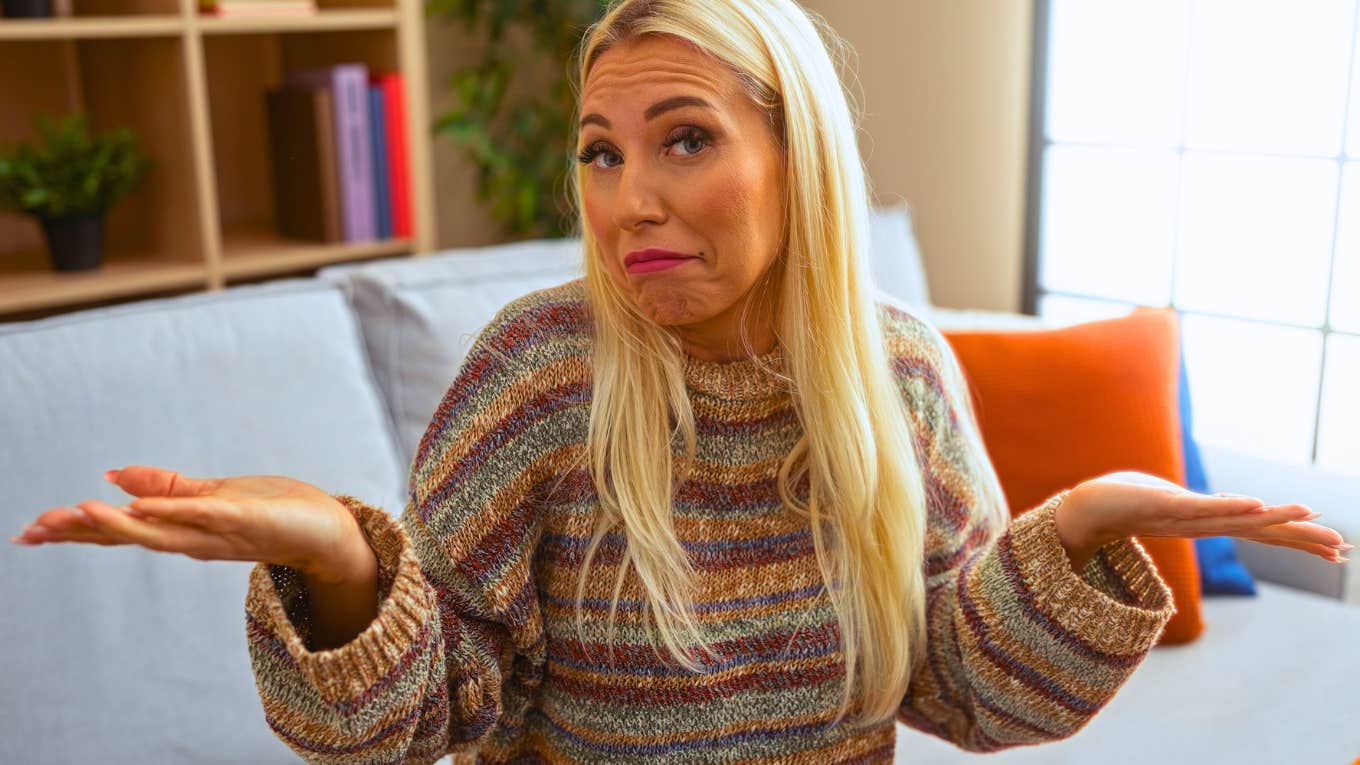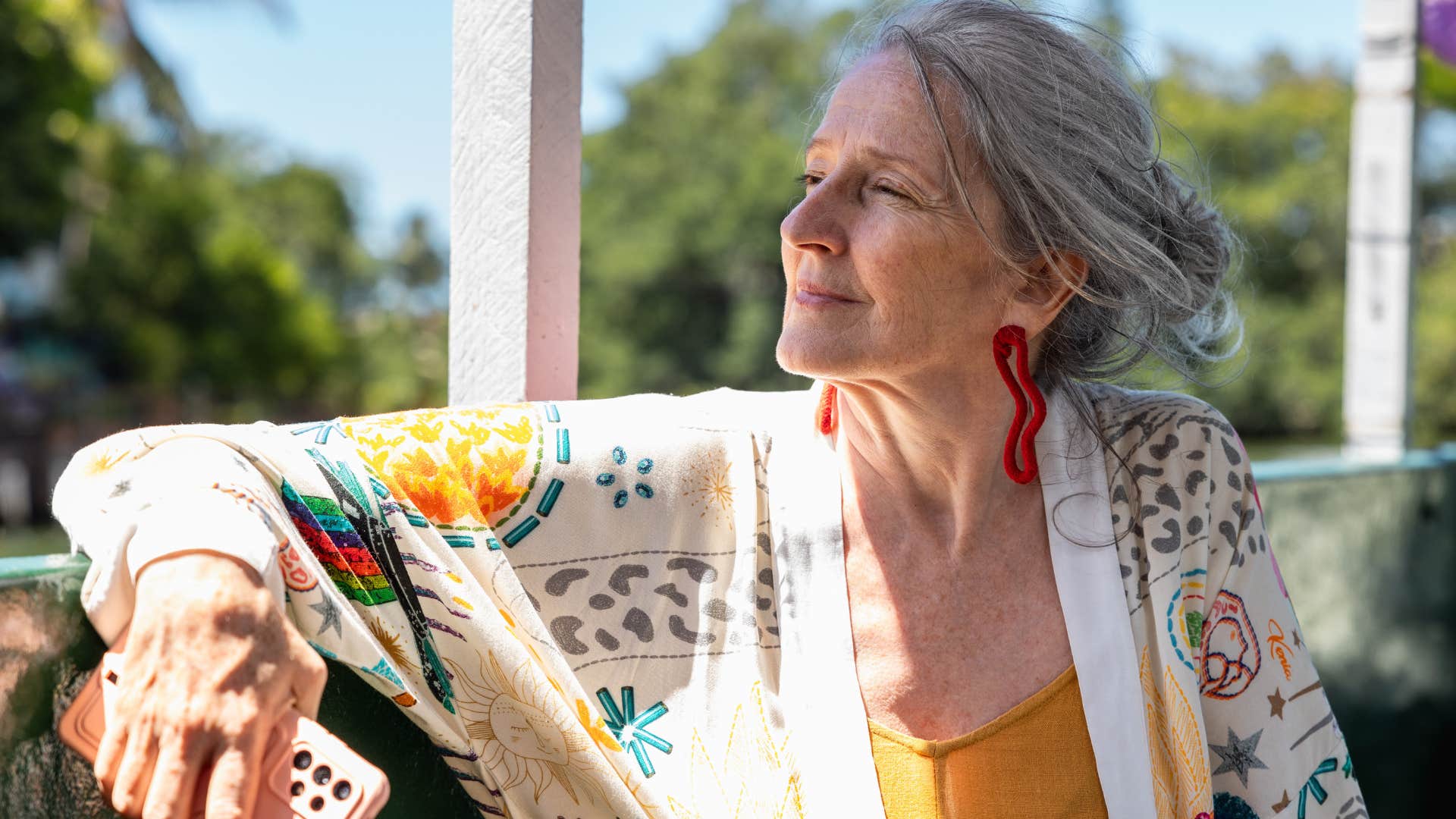People Who Stop Apologizing As They Get Older Usually Have These 11 Reasons
What you think about them is none of their business.
 Krakenimages.com | Shutterstock
Krakenimages.com | Shutterstock Apologizing when you are wrong is an absolute necessity. Then there are people who over-apologize out of people-pleasing habits or guilt. They may not have done anything wrong, but their first inclination is to take accountability and make others feel comfortable.
But for some, owning up to things they never even did gets very old over time. We become more self-aware, experience some psychological growth, and work our way through life. That evolution organically results in a tendency to stop apologizing as we get older for very specific reasons.
People who stop apologizing as they get older usually have these 11 reasons
1. They start to value their time and energy
 Joana Baumg from Studio Brazil via Canva
Joana Baumg from Studio Brazil via Canva
Mature adults know that tomorrow is not promised to anyone. They no longer have time to focus on pleasing other people and instead prioritize their peace and well-being. Part of that prioritization means no longer taking on unnecessary burdens. That means that they don't have the capacity to try to be responsible for things they did not do.
Not every disagreement requires an apology. Just because a person doesn't like what you said doesn't mean you did something wrong. Having the clarity and self-assuredness to never apologize for respectfully expressing yourself is peak grown folk behavior.
2. They have set healthy boundaries
 Zmaster from Getty Images via Canva
Zmaster from Getty Images via Canva
The strong sense of self that organically develops with age makes you realize that anyone who does not respect your boundaries doesn't belong in your life. You learn to say "no" unapologetically, set limits that people know better than to cross, and put your needs first.
In the past, setting boundaries and being strict about not allowing anyone to cross them was hard. You wanted people to like you, and you wanted to be fun to be around. Adulting is coming to the realization that good relationships happen because everyone has and respects boundaries, not despite them.
3. They understand their responsibilities
 RDNE Stock project from Pexels by Canva
RDNE Stock project from Pexels by Canva
When we get older, experience reveals what we should and should not be taking accountability for. We control the things that we can and detach from the rest, knowing that what is meant to be will be. We do our best and know that it was good enough. Don't get me wrong, accountability is easy with time, but we are no longer shouldering undue blame.
Some of the things that are no longer our responsibility are other people's feelings, decisions, or interpretations, how they feel about us, and what they think about how we live our lives. Everyone gets one shot at this. When it's over, it's over. Living your best life is to focus on what really matters to you.
4. Being liked by everybody becomes overrated
 GoodLifeStudio from Getty Images Signature via Canva
GoodLifeStudio from Getty Images Signature via Canva
Growing is understanding that you are not going to be liked by everyone. You will also not like every person you encounter, and that's okay. When you become realistic about how people operate, you will fully understand that being liked is subjective. Some people won't even know you, but decide you are just not for them.
When you outgrow your need to be universally liked, you start to do things because they feel right to you. You no longer worry about acceptance or putting on a front to impress another person. You get to be exactly who you were put on this earth to be, and those who don't like it can move around.
5. They learn the difference between being polite and being a doormat
 shironosov from Getty Images via Canva
shironosov from Getty Images via Canva
There's a thin line between being polite and letting people wipe their muddy boots on your forehead. People who tend to over-apologize do so because they want to be perceived as kind people. They can't have people running around telling others how rude they were. So, they err on the side of self-sacrifice while allowing others to escape culpability.
But when you get older, you stop confusing being nice with self-erasure. You know that you can be cordial without groveling or being a doormat. You allow other people to take accountability for their own actions and never chase them down when they decide not to. You let people be exactly who they are, so you know where to place them in your life.
6. They get apology burnout
 Kaboompics.com from Pexels via Canva
Kaboompics.com from Pexels via Canva
Don't you ever get tired of being sorry? You should. Over-apologizing can impact your mental health in so many ways. It decreases your confidence, undermines your authority, makes you feel guilty, and shifts the power dynamics so you lose integrity. The little five-letter word can do big psychological damage.
Apologies are more meaningful when they are given justifiably. When you dole them out haphazardly, you start to look, well, sorry. Repeatedly apologizing even when it's not warranted can make you feel diminished and can be used against you. As you age, you start to know better and do better.
7. They start to value assertive communication over passive guilt
 Ivan Moreno sl via Canva
Ivan Moreno sl via Canva
A well-placed apology can be the equivalent of kissing the ring. Instead of speaking up and being heard, you choose to bow down and take an inferior position. Life has taught us that expressing ourselves is much more valuable than taking on undeserved guilt and saying you're sorry when it is not necessary.
Not only do we forego the performative concessions, but we stop expecting them from others, too. We don't need you to stroke our egos by telling us we are right and you are wrong. We take pleasure in conversations of substance that make us think and keep us on our toes.
8. They become perfectly imperfect
 Kampus Production from Pexels via Canva
Kampus Production from Pexels via Canva
Perfection is a myth. It is purely subjective and means different things to different people. I have yet to meet a person who has lived up to that standard. As I have gotten up in age, I have let go of the need to be everything to everybody. I accept myself, flaws and all, and will never reduce myself because I don't meet the standards placed on me.
Toxic perfectionism is a mindset that has kept many of us feeling like we would never be enough in our younger years. Now, we no longer see a misstep as a reason to shame ourselves or make amends. Mistakes are a part of the human experience, and we are determined to embrace them all.
9. They've embraced true accountability
 SDI Productions from Getty Images Signature via Canva
SDI Productions from Getty Images Signature via Canva
When you become more accountable, you become less apologetic. Taking responsibility for things upfront and understanding the risk involved means that if it goes wrong, you know it's on you and have no intention of shifting the blame. You took a calculated risk and have already prepared yourself to handle any fallout.
Instead of saying you are sorry as a reflex, you focus on making things right and learning from the errors you have made. Words without actions mean nothing, so you focus on doing the things that move the needle instead of wallowing in guilt.
10. They allow themselves to feel their feelings
 Milko from Getty Images Signature via Canva
Milko from Getty Images Signature via Canva
No more being sorry for getting upset or angry. You don't have to apologize because you were too tired to go out or were having a bad day. Those are human emotions, and as we age, we learn to embrace them as part of the beauty of life. We won't apologize for our feelings anymore. We are grateful for them because isn't that the whole purpose of life?
Feelings are to be validated, not faulted. You should never apologize for how you feel, even if everyone in the room feels differently. As autonomous people, we are meant to have varying experiences that make up the spice of life. Imagine the boredom we would face if everyone felt that same all the time.
11. They choose peace over guilt
 Oksana Fedorchuk from Oksana Fedorchuk via Canva
Oksana Fedorchuk from Oksana Fedorchuk via Canva
Guilt is one of the worst feelings in the world. You live with it day in and day out, wondering what you might have done differently to get a different outcome. But feeling guilty is not effective for anyone. It eats away at you internally, a cross to bear for eternity.
Older people opt for peace instead. They don't carry guilt that is not theirs, and even when it is, they know how to take responsibility and move on with life. Mature adults realize that punishing yourself for things you cannot change serves no one. Their internal peace matters much more than external validation.
NyRee Ausler is a writer from Seattle, Washington, and the author of seven books. She focuses on lifestyle and human interest stories that deliver informative and actionable guidance on interpersonal relationships, enlightenment, and self-discovery.

